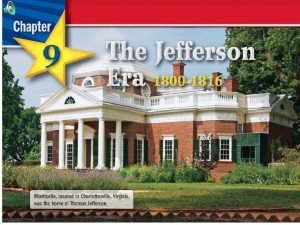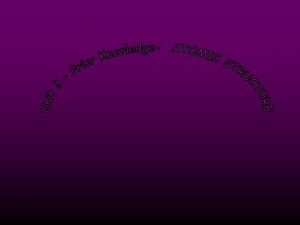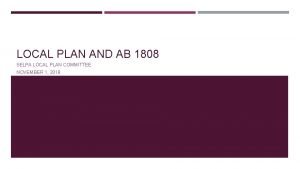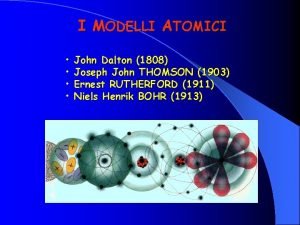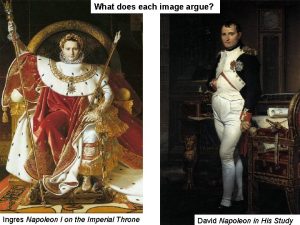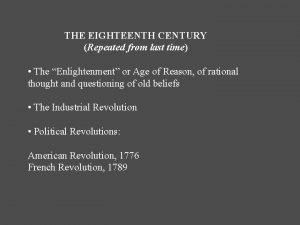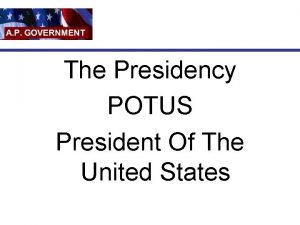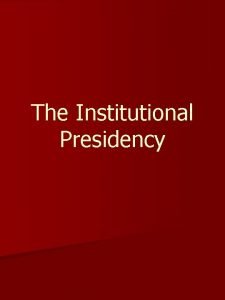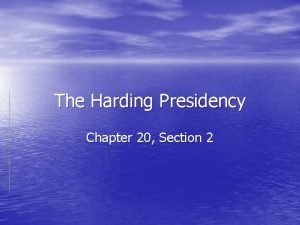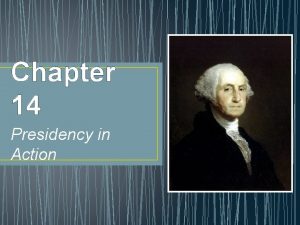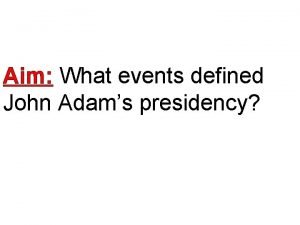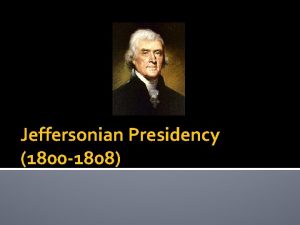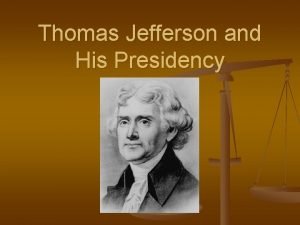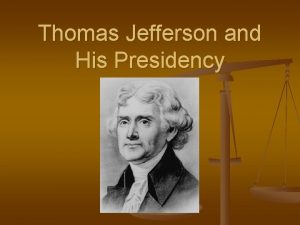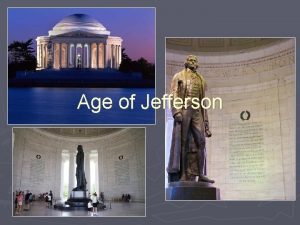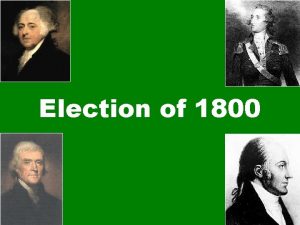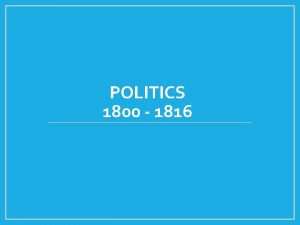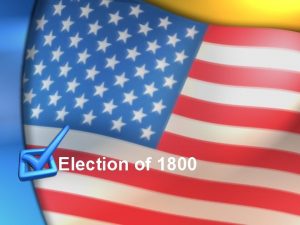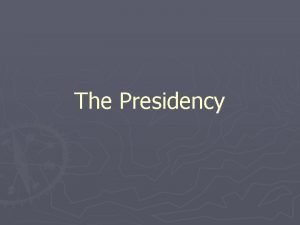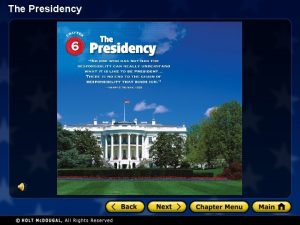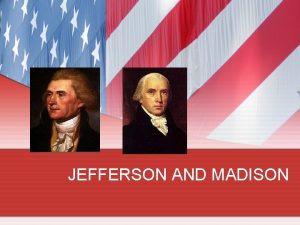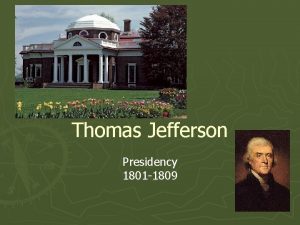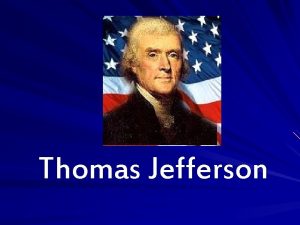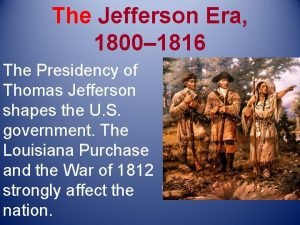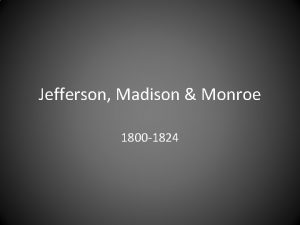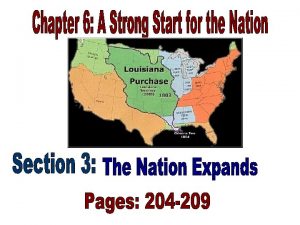Jefferson and his Presidency 1800 1808 Election of


















- Slides: 18

Jefferson and his Presidency 1800 -1808

Election of 1800 • Federalists ran John Adams again – Strong central government and law and order – Weakened by Alien and Sedition Acts, peace with France and split with Hamilton • Democratic-Republicans ran Thomas Jefferson – First true “political party” – Agrarian, states’ rights – Accused of fathering kids with slaves, being anti-religion • Jefferson (and the Dem-Rep. Party) won • “Revolution of 1800” = Peaceful transfer of power to opposing political force was unprecedented (which is rare after a revolution in world history)

Thomas Jefferson • Jefferson was a new type of President • Liked to dress more informally, like a common man = identified with small government • Favored French culture over British • Opposed slavery, but didn’t see how it could be abolished • Was an inventor, philosopher, scientist; Designed his own home, Monticello • However, he was extremely intellectually inconsistent

Jefferson’s Presidency • Sought to downplay formality of government and eliminate distinctions between class and position – Effort to be more “democratic” in spirit instead of monarchical tendencies of Federalists • Wanted to avoid industrialization and urbanization – Wanted nation based on agriculture • Wanted very limited central government – Cut military and spending to eliminate debt – Alien and Sedition Acts expired and were not renewed – Excise tax on whiskey was repealed • However, Jefferson’s actions in office contradicted his political philosophy – 4 major actions/events demonstrate this

1) Judiciary Act of 1801 • Last minute Federalist act passed to keep Federalists in control of judicial branch • Tried to do this by appointing many judges in the days before Adams left office - “midnight judges” – Jeffersonians saw this as Federalist attempt to keep control of judicial branch – “court packing” • Jefferson wanted to fill positions from people in his party – Did not deliver notices of appointment to “midnight judges” after he was sworn in, causing the case Marbury v Madison

Marbury v. Madison (1803) • Marbury was a midnight judge who did not receive his commission – Sued Secretary of State James Madison to force delivery of commission • Chief Justice Marshall – Ruled section of Judiciary Act of 1789 allowing direct appeal to the S. C. was unconstitutional, therefore Marbury was not entitled to his commission. • sacrificed Federalist victory for increase in S. C. ’s power – This established the precedent of judicial review • Supreme Court has authority to review acts of Congress and declare unconstitutional • States tried to claim right to determine constitutionality in Kentucky resolutions (1798)

Impeachment of Samuel Chase • Federalists now had lifelong power, Judicial Branch now had power to check/balance other two branches • Jefferson attempted to impeach Supreme Court Justice Chase as revenge for Marbury decision • Was acquitted because Congress ruled that an official can only be impeached for treason, bribery or other high crimes or misdemeanors • Impeachment campaign a failure but forced judges to be more cautious and less partison in their decisions

2) Barbary Pirates • Jefferson had eliminated most military spending to save money and follow republican ideas – Distrusted standing armies – feared it could lead to dictatorships – Believed navy was unnecessary for agrarian nation • Barbary States of North Africa sent out pirates to attack ships • Kidnapped American ships and held them for ransom • Despite distrust of centralized, powerful military, Jefferson sent navy to fight pirates to stop pirates • US gets peace treaty in 1805 • Demonstrated America’s ability to defend itself

3) Louisiana Territory • Napoleon takes Louisiana back from Spain in a secret treaty in 1800 – Made Americans worried – Right of deposit was rescinded in 1802 and began to charge Americans for passing through New Orleans • Westerners depended on access to Mississippi for trade and survival – Jefferson sent James Monroe to France to buy New Orleans for $10 million • Napoleon had lost interest in North America, so he sold all of his territory for $15 million • This doubled the size of the United States

Haitian Revolution and Louisiana Purchase Haitian Revolution (1791 -1803) • Haitians (Santo Domingo) revolt against France during French Revolution – Led by Toussaint L’Ouverture • Haitians fight off French armies and mosquitos with yellow fever killed troops • Napoleon believed he needed Haiti to control Louisiana – Also did not want to encourage America to ally with Britain while France was fighting Britain Louisiana Purchase (1803) • Napoleon preferred US becoming legitimate global power to help keep Britain in check • Since Napoleon lost Haiti, he decided to sell Louisiana • Monroe and Livingston were not authorized to make purchase – Decided to buy it anyway for $15 million on April 13, 1803 – Some believed land was worthless

Jefferson’s constitutional dilemma • Constitution does not give Congress power to buy land – Jefferson (strict construction) • Jefferson decided to support the purchase anyway, go against his convictions for the perceived greater good of the country • Louisiana doubled the size of the United States – Guaranteed access to Mississippi – Believed it insured success of America and democracy – Allowed for expansion of states across the continent – 13 new states would be made from the territory (828, 000 acres)

Louisiana Purchase Effects of Purchase • Precedent established that US can purchase additional land – New lands would create states admitted on equal footing – Allowed Louisiana to keep Napoleonic Code instead of British common law • Allowed America to disengage from Europe because no European power left on North America Lewis and Clark Expedition (Corps of Discovery) • Americans did not know what was within Louisiana Purchase • led by his secretary Meriwether Lewis and William Clark – to find all water route to Pacific, study Indian tribes, nature and the environment – Sacajawea helped the expedition • Lewis and Clark left spring 1804 arrived at Pacific December 1805 • US claimed Oregon • Expedition gave details of what was in Louisiana


Aaron Burr Conspiracies • Federalists feared new western states would favor farmers and debtors and hurt commercial and banking interests of east • Some New Yorkers and New Englanders wanted to secede and have Aaron Burr as their President – Hamilton opposed Burr’s attempts to be elected governor of NY – Burr killed Hamilton in a duel on July 11, 1804

Burr Conspiracy • Burr went west to gain control over a territory that he could lead (1806) – Went to England Spain for support – Wanted to establish independent country in West • Governor James Wilkinson of Louisiana turned Burr in as a traitor • Courthouse of Trial Burr was acquitted of treason – Chief Justice Marshall limited definition of treason to only people who make war against the US – His political career was ruined Chief Justice Marshall Verdict sheet

War between Britain and France • Britain and France resumed Napoleonic Wars in 1803 • US had made money trading with both sides and Europe as a neutral – Both countries try to stop trade • British would board American ships and force American sailors into British navy (impressment) – US claimed more than 6, 000 Americans had been taken between 1808 -1811 – This practice posed a major foreign policy dilemma for Jefferson – Had to uphold US autonomy, while at the same time believing in non-intervention / isolationism Battle of Copenhagen 1807

4) Embargo Act of 1807 • US too weak to fight either France or England • Embargo Act passed to stop American trade with Europe – Refusal to trade w/either nation – US hoped Europe’s need for American raw materials and food would force France and England to change policies / end impressment – Jefferson was trying to show new way of diplomacy without fighting • Effects – Embargo hurt Democrat-Republican popularity – Opponents believed law was tyrannical. Federalists increased in power in the north – Also (accidentally) encouraged local manufacturing, despite Jefferson’s belief in agricultural economy – Exports decreased from $108 m-1806 to $22 m-1807

Jefferson’s Intellectual Inconsistency Small Gov’t Jefferson Big Gov’t Jefferson • Identified w/common man, believed in the “agrarian ideal” • Wrote Declaration • One of the wealthiest men in America – "Nothing is more certainly written in the book of fate than that these people [slaves] are to be free. " • Believed in small government – Repealed Whiskey Tax – Alien/Sedition Acts expired • Owned slaves – "Nor is it less certain that the two races, equally free, cannot live in the same government. " • Did big government “stuff” 1. 2. 3. 4. Marbury v. Madison LA purchase (Lewis & Clark) Barbary War Embargo Act
 Apush chapter 7 hammering out a federal republic
Apush chapter 7 hammering out a federal republic The election of 1800 showed that
The election of 1800 showed that Banjo lesson painting
Banjo lesson painting Dalton 1808
Dalton 1808 Ab 1808
Ab 1808 Atomic model (1808)
Atomic model (1808) 1808 atomic model
1808 atomic model It is a habitual and firm disposition to do good
It is a habitual and firm disposition to do good John dalton modello atomico
John dalton modello atomico The death of marat
The death of marat David oath of the horatii neoclassicism
David oath of the horatii neoclassicism Third of may 1808 meaning
Third of may 1808 meaning La imagen del átomo expuesta por dalton
La imagen del átomo expuesta por dalton Presidency line of succession
Presidency line of succession Institutional presidency definition
Institutional presidency definition Chapter 12 section 2 the harding presidency
Chapter 12 section 2 the harding presidency Chapter 14 the presidency in action answer key
Chapter 14 the presidency in action answer key What major events happened during john adams presidency
What major events happened during john adams presidency George washingtons presidency
George washingtons presidency

